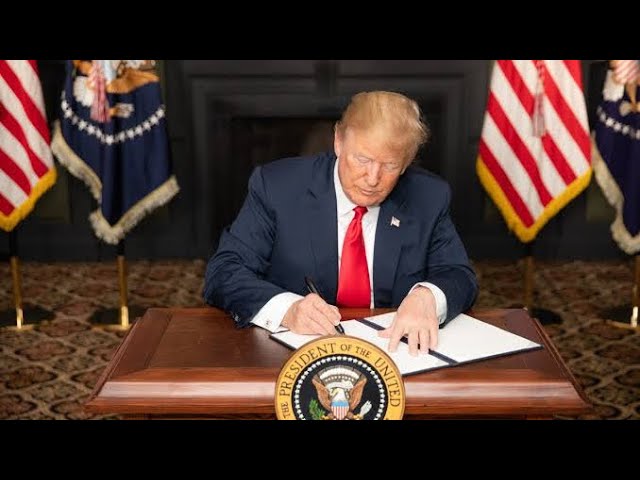Trump’s Incoming Administration Plans Severe Sanctions Against ICC Over Arrest Warrants for Israeli Leaders
Edited by: Fern Sidman
President-elect Donald Trump is preparing to unleash a sweeping package of sanctions against the International Criminal Court (ICC) in The Hague immediately after assuming office, according to exclusive details shared with Israel Hayom. These measures, anticipated to be revealed as early as January 21, are poised to represent one of the most aggressive challenges ever mounted against an international judicial body by a U.S. administration.
Israel Hayom reported that the incoming administration’s strategy focuses on targeting both individual ICC officials, including judges and prosecutors, and the institution itself. The Trump team plans to classify the ICC as an entity posing a direct threat to U.S. national interests. This classification will reportedly follow the same legal protocols the State Department uses when designating foreign terrorist organizations. Under these provisions, anyone collaborating with or supporting the ICC could face severe penalties.
According to the information provided in the Israel Hayom report, financial institutions around the world will be under immense pressure to sever ties with ICC personnel or risk facing U.S. sanctions. Such measures would have far-reaching implications, freezing the financial operations of ICC judges and prosecutors. Routine financial tasks—such as credit card payments and accessing personal accounts—will become virtually impossible, with exceptions made only for essential purchases such as food and medicine. Furthermore, any U.S.-based assets belonging to ICC personnel or the institution will be frozen.
This economic chokehold, as emphasized in the Israel Hayom report, mirrors punitive measures previously imposed on Israeli individuals by the outgoing U.S. administration. The Trump team is sending a clear message: cooperating with the ICC against Israel—or any U.S. ally—will come at a steep cost.
The Trump administration’s plan, as reported by Israel Hayom, extends beyond unilateral action. Trump’s team aims to rally U.S. allies to reject cooperation with any ICC arrest warrants against Israeli officials, particularly Prime Minister Benjamin Netanyahu and former Defense Minister Yoav Gallant. The ultimate goal is to create an environment where the ICC finds it impossible to enforce its warrants without significant diplomatic and economic repercussions.
The report in Israel Hayom highlighted that this campaign relies on a twofold strategy: isolating the ICC diplomatically and exerting internal pressure on the court. Trump officials hope that during appeals, either Chief Prosecutor Karim Khan or the judges will identify sufficient legal grounds to retract the warrants. This would allow the ICC to save face while effectively reversing its actions.
The sanctions and diplomatic push reflect a broader worldview held by Trump’s incoming team: that the ICC’s targeting of Israeli officials sets a dangerous precedent. Officials fear that the same mechanisms could be turned against American leaders and military personnel in the future.
As per the information contained in the Israel Hayom report, Trump administration officials see the ICC’s actions as a fundamental threat to U.S. national security. They argue that by pursuing arrest warrants against Netanyahu and Gallant, the court is attempting to undermine the ability of the U.S. and its allies to defend themselves against existential threats.
Republican lawmakers, including Senator Tom Cotton (R-Ark.), who is set to lead the Senate Intelligence Committee, have been especially vocal. In a statement to Israel Hayom, Cotton referred to the ICC as a “kangaroo court” and described Chief Prosecutor Karim Khan as a “deranged zealot.” Cotton invoked the U.S. legal provision known as the “Hague Invasion Act,” which grants the president authority to use “all necessary means” to free U.S. personnel detained by the ICC.
“There’s a reason we have the Hague Invasion Act,” Cotton told Israel Hayom. “Let me remind everyone: woe to anyone who attempts to enforce these lawless warrants against Israeli or American officials.”
The report in Israel Hayom pointed out that Trump officials view Israel’s predicament not as an isolated incident but as a warning sign. The same legal arguments and mechanisms deployed against Israeli leaders could easily be applied to American generals, politicians, and even the president. By targeting Netanyahu and Gallant, the ICC has, in the view of Trump officials, declared its willingness to challenge the sovereignty of powerful, democratic states.
For Trump’s team, this isn’t just about protecting Israel—it’s about safeguarding U.S. sovereignty and military command structures from international judicial overreach. As was indicated in the Israel Hayom report, this worldview is deeply rooted in the Republican Party’s long-standing skepticism toward international institutions perceived as infringing on national sovereignty.
Also reported by Israel Hayom was that the Trump administration is preparing for significant international backlash against these sanctions. European allies, many of whom are supportive of the ICC, may resist Trump’s hardline approach. However, Trump officials remain confident that economic leverage and diplomatic pressure will compel key allies to align with the U.S. stance.
At its core, the incoming administration’s approach reflects a fundamental rejection of the ICC’s authority over sovereign nations. As articulated to Israel Hayom, Trump’s team believes that international justice mechanisms must not come at the expense of national security or democratic governance.
In the coming months, the world will witness a high-stakes clash between the Trump administration and the ICC. The outcome of this confrontation will not only shape the future of U.S.-ICC relations but also redefine the balance between international judicial authority and state sovereignty on the global stage.





